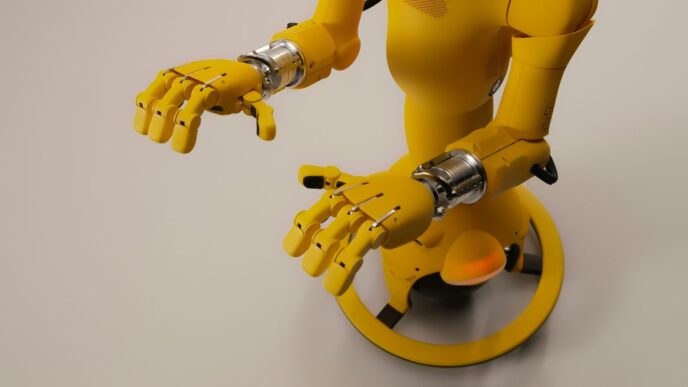In today’s busy world, keeping things organized and getting stuff done can feel like a real challenge. That’s where an AI virtual assistant comes in. Think of it as your smart helper, ready to take on your daily tasks. Whether you’re running a business or just trying to manage your own schedule, an AI assistant can really change how you work. We’re going to look at what makes a good AI virtual assistant, why they’re so helpful, and how they can make your life easier.
Key Takeaways
- An AI virtual assistant is smart software that helps manage tasks, schedule meetings, and handle emails, going beyond basic chatbots.
- Key features include automatic calendar management, smart task prioritization, automated email responses, and easy note-taking.
- Using an AI virtual assistant saves time, cuts down on stress, reduces mistakes, and can be more cost-effective than hiring help.
- These assistants can connect with various platforms like calendars, email, CRMs, and cloud storage to streamline your workflow.
- AI virtual assistants learn your preferences over time, offering personalized suggestions and adapting to your unique work style.
Understanding the Power of an AI Virtual Assistant
What is an AI Virtual Assistant?
Think of an AI virtual assistant as your digital sidekick, powered by smart technology that lets it understand what you’re saying and do things for you. It’s not just a simple program that follows commands; it can actually grasp the meaning behind your words, even if you don’t say things perfectly. These assistants are built using things like natural language processing, which is how they understand human talk, and machine learning, which helps them get better over time. They can handle a lot of different jobs, from scheduling meetings to sorting through emails, and they do it with very little input from you. They’re designed to make your work life easier by taking on the tasks that eat up your day.
Why You Need an AI Virtual Assistant in 2025
In today’s world, we’re all trying to get more done with less time. Professionals often spend a big chunk of their week on tasks that don’t really need a human touch, like data entry or setting up appointments. Studies show that people can waste up to 40% of their time on these kinds of administrative jobs. An AI virtual assistant can give that time back to you. Imagine not having to manually update your customer relationship management system; an AI assistant can automate repetitive business tasks for you. This means less stress, fewer mistakes, and more time to focus on the important stuff, like growing your business or working on creative projects. It’s becoming less of a nice-to-have and more of a necessity for staying competitive.
The Evolution Beyond Basic Chatbots
AI virtual assistants have come a long way from the early chatbots that could only respond to very specific keywords. Today’s assistants are much more sophisticated. They can understand the context of a conversation, pick up on your tone, and even handle slang or misspellings. They don’t just react; they can anticipate what you might need next. For example, if you usually send out a client report every Friday, your AI assistant might prompt you, asking if you want to start drafting it. This ability to learn your habits and preferences makes them incredibly useful. They can also connect with all the different tools you use every day, like your email, calendar, and project management software, acting as a central hub for your work.
Key Features That Define a Superior AI Virtual Assistant

So, what actually makes an AI virtual assistant stand out from the crowd? It’s not just about having a digital helper; it’s about having one that truly understands your needs and streamlines your day. Think of it as upgrading from a basic calculator to a powerful computer – the difference is immense.
Seamless Calendar Scheduling and Management
Forget the back-and-forth emails trying to find a meeting time. A top-tier AI assistant can scan your calendar, check the availability of others (if integrated), and propose optimal slots. It can even send out invites and handle reschedules automatically. Imagine telling your assistant, "Find a 30-minute slot for me and Sarah next week," and having it done without you lifting a finger. This kind of intelligent scheduling can save you hours each month, making sure you’re always where you need to be, on time. It’s like having a personal secretary who never sleeps.
Intelligent Task Prioritization and Workflow Automation
We all have those to-do lists that seem to grow by the minute. A superior AI assistant doesn’t just list your tasks; it helps you tackle them. Using machine learning, it can analyze your workload, identify urgent items, and even break down larger projects into smaller, manageable steps. It might suggest, "You have that big client report due Friday, and your team meeting is tomorrow. Let’s focus on finishing the research for the report today." This proactive approach helps prevent tasks from falling through the cracks and keeps your projects moving forward smoothly. It’s about working smarter, not just harder.
Automated Email Responses and Triage
Your inbox can be a black hole of productivity. A good AI assistant can act as your email gatekeeper. It can draft replies to common inquiries, flag messages that require your personal attention, and even sort your inbox based on importance. For instance, it might learn that emails from your direct manager are always high priority and ensure you see them immediately, while automatically categorizing newsletters. This means less time spent sifting through messages and more time on actual work. Some systems can even learn your writing style to make the automated responses sound genuinely like you, which is pretty neat. You can find tools that help manage your communications, like the OmGate which helps manage your home access OmGate.
Effortless Note-Taking and Transcription
Ever been in a meeting and struggled to jot down every important detail? AI assistants excel here. They can transcribe conversations in real-time, identify key action items, and even summarize lengthy discussions. Imagine a meeting where the AI assistant captures everything, highlights who is responsible for what, and provides a concise summary afterward. This frees you up to participate fully in the conversation rather than being stuck behind a notepad. The accuracy of these transcriptions is getting better all the time, meaning you won’t miss a single crucial point.
Leveraging AI Virtual Assistants for Enhanced Productivity
It’s easy to get bogged down in the day-to-day stuff, right? Like, you know, trying to figure out who can make that meeting next week, or remembering to follow up on that email you sent ages ago. AI virtual assistants are basically here to take all that off your plate. They’re not just fancy chatbots; they’re tools that can actually learn how you work and help you get more done, with less hassle.
Think about the time you spend just trying to coordinate schedules. It’s a real drain. An AI assistant can handle that, finding times that work for everyone and sending out invites. It’s like having a super-organized personal assistant, but it’s software. This frees you up to actually focus on the important parts of your job, the stuff that requires your brainpower, not just your calendar.
Here’s a quick look at how they help:
- Time Savings: Imagine getting back hours each week. By automating things like scheduling, sending follow-up emails, and even taking notes during calls, you get a significant chunk of your day back. This means more time for creative thinking or client work.
- Less Stress, More Order: When your tasks are prioritized and your schedule is managed automatically, things just feel calmer. You’re less likely to miss important deadlines or double-book yourself. It brings a sense of control back to your workday.
- Fewer Mistakes: Let’s be honest, we all make mistakes, especially when we’re tired or rushed. AI assistants are programmed for accuracy. They won’t forget to add a detail to a meeting invite or send a response to the wrong person. This consistency is a big deal for maintaining professionalism.
- Smart Spending: Getting this level of support used to mean hiring someone. Now, you can get similar benefits for a fraction of the cost. It’s a way to get executive-level assistance without the executive-level price tag.
- Grows With You: Whether you’re a one-person show or part of a big team, an AI assistant can adapt. As your workload changes or your business grows, the assistant can handle more, scaling up without needing new hires.
People are reporting big jumps in how much they can get done, sometimes up to 30% more. It’s not just about doing more, though; it’s about doing the right things and feeling less overwhelmed while you do them.
Integrating Your AI Virtual Assistant Across Platforms
So, you’ve got this awesome AI virtual assistant, right? But what good is it if it’s just sitting there, not talking to your other tools? That’s where platform integration comes in. Think of it like giving your AI a passport to all your digital hangouts. It’s not just about having a smart assistant; it’s about making that assistant work with everything else you use daily.
The real power comes when your AI can connect the dots between different applications.
Unifying Productivity Suites and Communication Tools
Your AI assistant should be able to jump between your email, calendar, and messaging apps without you having to do anything. Imagine asking your AI to schedule a meeting, and it not only finds a time that works for everyone in your calendar but also sends out the invite via your preferred email client and posts a heads-up in your team’s Slack channel. This kind of cross-app coordination is what makes a big difference in saving time. It means less copy-pasting and fewer missed messages. Tools like Google Workspace or Microsoft 365 are common places for these integrations, and your AI should be able to manage tasks within them easily.
Connecting with CRM and Project Management Systems
This is where things get really interesting for businesses. If your AI can pull client information from your CRM, like Salesforce or HubSpot, and then use that to draft a follow-up email or create a task in your project management tool, like Asana or Trello, you’re basically automating entire workflows. For example, when a new lead comes in through your website, the AI could automatically add them to your CRM, assign a follow-up task to a sales rep, and even schedule a reminder for that rep. This keeps everything organised and makes sure no opportunity falls through the cracks. It’s about making your business operations run more smoothly.
Leveraging Cloud Storage for Seamless Data Access
Your AI assistant also needs to be able to grab files or save information to your cloud storage, whether that’s Dropbox, Google Drive, or OneDrive. Picture this: you’re on a call, and someone asks for a specific document. You can tell your AI to find that file in your cloud storage and send it over, all without interrupting the conversation. Or, after a meeting, your AI can take the notes it transcribed and automatically save them to the correct folder in your cloud drive. This keeps your digital workspace tidy and makes sure you can access what you need, when you need it. It’s a pretty neat way to keep your data organised and accessible, making your work life a lot simpler. You can find more about how AI is used in software development, including virtual assistants, on this guide.
Personalization and Adaptive Learning with AI Assistants
It’s pretty wild how much AI assistants have changed from those clunky chatbots we used to see. The really good ones today don’t just follow orders; they actually learn how you work. Think of it like having a junior assistant who gets better at their job the more they do it, but this assistant is digital and never calls in sick.
Building User Profiles for Tailored Support
These assistants start by building a picture of you. They notice things like:
- Your preferred times for meetings.
- The way you usually write emails – formal, casual, whatever.
- Who you talk to most often for work.
- What tasks you tend to do at certain times of the week.
This profile isn’t just a list of facts; it helps the AI figure out what you might need next. It’s like they’re trying to get inside your head, but in a helpful way. They remember your habits, so they can start anticipating what you’ll ask for.
Context-Aware Suggestions and Proactive Assistance
Because they’re learning your patterns, AI assistants can offer suggestions that actually make sense. For example, if you always send out a client report on Friday mornings, your assistant might pop up and say, "Hey, it’s Thursday. Do you want me to start drafting that client report for tomorrow?"
It’s not just about responding to commands anymore. They can look at your calendar, your to-do list, and your recent communications to offer help before you even ask. This proactive approach can save a surprising amount of time and mental energy. It’s like having a little helper whispering reminders and suggestions throughout your day.
Adapting to Your Unique Workflows Over Time
The real magic happens as you keep using the assistant. The more you interact with it, the more it refines its understanding of your specific way of doing things. If you start a new project and your assistant notices you’re handling tasks in a particular order, it will adjust its own suggestions and automations to match.
This means your AI assistant becomes less of a generic tool and more of a personalized partner. It’s not just about getting tasks done; it’s about getting them done your way, more efficiently than before. It’s a bit like training a dog – the more consistent you are, the better it understands what you want.
Industry-Specific Applications of AI Virtual Assistants

AI virtual assistants aren’t just for general productivity anymore; they’re really starting to shine when tailored to specific industries. Think about it – the needs of a busy doctor’s office are pretty different from those of a real estate agency, right? That’s where specialized AI assistants come in, making a big difference.
Transforming Hospitality and Customer Service
In hospitality, AI assistants can handle a lot of the front-desk work. They can manage guest inquiries, take reservations, and even upsell services like spa treatments or dinner reservations. After a guest checks out, the AI can send follow-up emails, asking for feedback or offering a discount on their next stay. This kind of consistent, 24/7 service really improves the guest experience. For example, a hotel could use an AI assistant to answer common questions about Wi-Fi passwords, pool hours, or local attractions, freeing up human staff for more complex guest needs.
Streamlining Healthcare Administration
Healthcare providers are finding AI assistants incredibly useful for administrative tasks. They can schedule appointments, send out reminders for check-ups or prescription refills, and even help with pre-visit paperwork. AI can also triage patient questions, handling routine inquiries like clinic hours or accepted insurance plans. This takes a load off receptionists and nurses, letting them focus more on patient care. A clinic might use an AI assistant to manage appointment bookings and send out automated reminders, cutting down on no-shows. This helps manage patient flow more effectively, similar to how some companies manage connected devices.
Boosting E-commerce and Real Estate Operations
For online stores, AI assistants are great for customer service. They can answer questions about products, track orders, and even process returns. AI can also suggest products to customers based on their browsing history, which can lead to more sales. In real estate, AI assistants can act like digital agents. They can qualify leads by asking potential buyers about their budget and preferred locations, then schedule property viewings. They can also handle tenant requests for things like repairs, making property management smoother.
Supporting Legal and Professional Services
Law firms and other professional services can use AI assistants to manage client intake and communication. AI can triage new inquiries, book initial consultations, and follow up on case updates. They can also handle basic document requests, saving valuable time for lawyers and paralegals. This allows professionals to spend more time on billable work and client strategy, rather than getting bogged down in administrative details. For instance, a law firm might use an AI assistant to gather initial information from potential clients before a consultation.
Unlocking Creative Potential with AI Virtual Assistants
It’s not just about managing your schedule or answering emails anymore. AI virtual assistants are stepping up to help with the more creative side of work, too. Think of them as your digital brainstorming buddy or your super-fast content generator.
Lightning-Fast AI Content Creation
Need a blog post draft, social media updates, or even website copy in a hurry? AI assistants can whip these up in minutes. They can take a few bullet points or a general idea and turn it into readable text. This doesn’t mean you just copy and paste, of course. You’ll still want to add your own voice and make sure it fits your brand. But it’s a huge time saver for getting initial drafts done or overcoming writer’s block. It’s like having a junior writer on staff, available 24/7.
Advanced AI Image Generation Capabilities
Visuals are important, right? AI can now create images from text descriptions. You can describe the kind of picture you need – maybe a "calm beach scene at sunset" or "a futuristic cityscape with flying cars" – and the AI will generate unique images. This is great for presentations, blog post headers, or social media graphics when you don’t have a designer handy or need something specific quickly. The quality is getting better all the time, offering a real alternative to stock photos.
AI-Powered Audio Conversion and Text-to-Speech
Got a long document you need to review but no time to read it? Or maybe you want to turn your written notes into an audio file for your commute? AI assistants can handle this. They can convert text into natural-sounding speech, making information more accessible. This is also useful for creating voiceovers for videos or podcasts, or for people who prefer listening over reading. It’s a simple way to make your content work harder for you across different formats.
Wrapping Up Your AI Assistant Journey
So, we’ve looked at how AI assistants can really change how you work. They can handle a lot of the boring stuff, like scheduling and answering emails, which gives you more time for the important things. It’s not just about saving time, either; these tools can help you make fewer mistakes and even lower costs compared to hiring more people. As AI keeps getting better, having one of these assistants is becoming less of a nice-to-have and more of a must-have to keep up. Think about what tasks take up too much of your day and see if an AI assistant could be the answer. It’s a smart way to get more done and feel less stressed about your workload.
Frequently Asked Questions
What exactly is an AI virtual assistant?
Think of an AI virtual assistant as a super-smart computer program that can help you with lots of different tasks. It’s like having a personal helper that can understand what you say or type and then do things for you, like scheduling meetings or answering emails. It’s way more advanced than just asking a smart speaker a question.
Why should I start using an AI virtual assistant now?
In today’s busy world, people waste a lot of time on small, repetitive tasks. An AI assistant can take care of these for you, freeing up your time so you can focus on more important things. It can help you feel less stressed and more organized, which is super helpful for getting more done.
Can AI virtual assistants really help me manage my schedule?
Absolutely! A good AI assistant can look at your calendar, find times that work for everyone, and even send out meeting invitations all by itself. It can also help you avoid scheduling conflicts, making sure your day runs smoothly without you having to do all the back-and-forth.
How does an AI assistant help with emails and tasks?
AI assistants can sort through your emails, figure out which ones are most important, and even write replies for you that sound like you. For tasks, they can help you figure out what’s most important to do next and remind you of deadlines, keeping you on track.
Can an AI virtual assistant learn how I like to work?
Yes, that’s one of the coolest parts! As you use it more, the AI assistant learns your habits, like when you prefer to have meetings or how you usually write emails. This means it can give you better suggestions and help you in a way that feels natural and personalized to you.
Are AI virtual assistants useful for creative work too?
Definitely! Some AI assistants are amazing at helping with creative tasks. They can help you write articles, social media posts, or even create images and audio really quickly. This means you can spend less time on the basic work and more time on the creative ideas.












